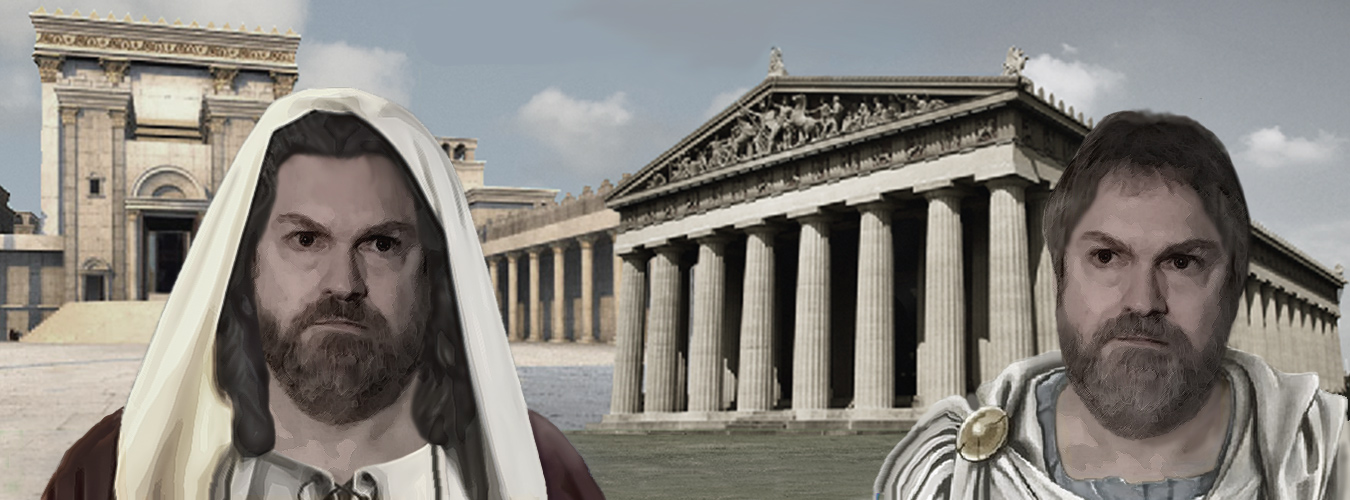In a YouTube video by Keith Thompson many claims are made about Word of Faith teaching and teachers. While I appreciate much of the work that Keith has done regarding atheism and Islam, he obviously is lacking in his understanding of the Word of Faith movement. For example, his video starts off with a few quotes from people he considers Word of Faith teachers, one of them being Benny Hinn. Since Keith’s video was uploaded in 2015 I’m assuming that it was created in 2014-2015, which would be over twenty  years after Benny Hinn renounced his affiliation with Word of Faith theology in a 1993 interview with Charisma Magazine. You can actually see how old his video clips of Hinn are from the old hairstyle and the fact that he was preaching in the long defunct Orlando Christian Center back in the 80s or early 90s. Yes, Hinn made a lot of irresponsible statements in those days, but any association that Keith Thompson or any other WoF opponent make now is misleading. He is NOT a WoF teacher.
years after Benny Hinn renounced his affiliation with Word of Faith theology in a 1993 interview with Charisma Magazine. You can actually see how old his video clips of Hinn are from the old hairstyle and the fact that he was preaching in the long defunct Orlando Christian Center back in the 80s or early 90s. Yes, Hinn made a lot of irresponsible statements in those days, but any association that Keith Thompson or any other WoF opponent make now is misleading. He is NOT a WoF teacher.
Keith makes a similar mistake later in his video claiming that Jimmy Swaggart of all people, is a WoF teacher. Anybody who knows much about Swaggart’s history knows that he strongly denounced WoF theology in 1982, in an article entitled “HYPER-FAITH: A NEW GNOSTICISM?” published in his magazine The Evangelist. Again, just as with Benny Hinn, Jimmy Swaggart is NOT WoF.
Keith also plays an audio of Creflo Dollar saying that “God never sleeps nor slumbers, and yet in the book of Mark we see Jesus asleep in the back of the boat”, suggesting that Dollar doesn’t believe in the deity of Christ. He also claims that WoF people teach that Christ was only a man while He was on the earth. While I haven’t spoken personally with Creflo Dollar about this, I strongly doubt that that is the case. I believe that, like most WoF adherents Creflo Dollar was merely making a distinction between Jesus’ deity and His humanity. The Hypostatic Union is a theological term meaning that Jesus was fully God and fully man. Stating that Jesus was asleep in the boat was not a denial of Jesus’ divinity, but an acknowledgment of His humanity. He had to eat and sleep and do all of the things that mortal humans do, and accordingly WoF theology says that Jesus did not work miracles because He was God, but because He was a man anointed by the Holy Spirit. After all, He was God for the first thirty years of His life, but He never performed a miracle until after the Holy Spirit descended upon Him at His baptism. Keith plays a similar quote of Joseph Good saying that we see Jeshua as a man instead of God, but he was making a similar point concerning the humanity of Jesus. This is consistent with the theological concept of “kenosis”, or “self-emptying” of some of Christ’s divine attributes spoken of in the 2nd chapter of Philippians. Again, that’s not a denial of His divinity, but an acknowledgment of His humanity, and that’s why in the 14th chapter of John Jesus said that we as believers would do the works that He did because He was sending His Holy Spirit to empower us for that purpose. We actually studied the Hypostatic Union and kenosis at Rhema, so certainly WoF opponents should know about them, and that they are both considered valid and orthodox theological constructs.
Keith also includes quotes from Mormon leader Brigham Young in the video. In so doing he equates the alleged polytheism of the WoF with that of Mormonism and pagan religions. However, even WoF opponents like Elliot Miller from the Christian Research Journal, a publication produced by the Christian Research Institute, see a clear distinction. Miller stated his views with CRI president Hank Hanegraaff.
(Hanegraaff ): I remember when I first became president of the Christian Research Institute, you and I had quite a number of discussions about the Word/ Faith theology. I, of course, at that point was very incensed about the fact that the Word/Faith Teachers, over and over again, say that redeemed man has the nature of God. They talk about us being little gods and I would say something like this to you, ‘Elliot, now this is really moving over into the kingdom of the cults and, you know, the Mormons tell us that we can become a god, but these people are telling us that we are God” and yet, you cautioned me and I think correctly so-not to just blanketly label these people as cultists-Why?
(Miller): Because they have their own unique understanding of what these terms mean. So there is a lot of orthodoxy within their teaching. In other words God is a personal God who did create the world, who is moral and holy, who gave us His law, who sent Jesus to die for our sins. In all of those respects they are different from both the Mormons and the New Age movement.
Nobody in the WoF movement is teaching polytheism to my knowledge. WoF theology holds to monotheism, but some within the movement have unwisely used the term “little gods” when discussing the Genesis account of God creating man in His image, and when discussing the divine nature that Peter mentioned in II Peter 1:4. It should be noted however that most of the statements to that effect are 20 or 30 years old, and the people making those statements wised up and removed the expression “little gods” from their vocabulary after getting hammered unmercifully by the watchdog groups.
Thompson then juxtaposes a number of statements with other WoF teachers alongside of those from Kenneth Hagin, creating a “groupthink” scenario that frankly doesn’t exist. Kenneth Hagin and his son Kenneth W. Hagin both stated that they don’t agree with much of what has been taught in the WoF movement. To be fair each minister’s views should be assessed on their own merits or lack thereof. I don’t condone many of the things that some people associated with the WoF movement have said and done, but since Kenneth Hagin was the leader of the movement I think it would only be fair to examine the claims regarding him.
 So let’s start with the quote of Kenneth Hagin that “The believer is as much an Incarnation as was Jesus of Nazareth.” This was taken from a message that Brother Hagin gave during the Christmas season in December of 1980. He was actually quoting E. W. Kenyon when he said this. Kenyon did a lengthy discussion on the Incarnation in his book “The Father and His Family”. Allow me to provide an excerpt of what he said.
So let’s start with the quote of Kenneth Hagin that “The believer is as much an Incarnation as was Jesus of Nazareth.” This was taken from a message that Brother Hagin gave during the Christmas season in December of 1980. He was actually quoting E. W. Kenyon when he said this. Kenyon did a lengthy discussion on the Incarnation in his book “The Father and His Family”. Allow me to provide an excerpt of what he said.
Incarnation means that Deity has become united with humanity in an individual.
The Incarnation is the only solution of the human problem. Since the fall of man the human has steadily been sinking lower and lower intellectually, morally, and spiritually, and the only hope is for Deity’s union with humanity to bring man back to his lost estate. The Incarnation should be desired by every sane man when he understands it, for it offers to humanity a hope, and without it man is hopeless. Every false religion that denies the Incarnation of Jesus of Nazareth has attempted to provide a theory of universal Incarnation in order to stimulate to a higher moral and spiritual life. Theosophy tries to make us believe that all men have the nature of Deity. The same thing is held by practically all our modern liberal theological teachers and preachers! That the so-called “Spark of Divinity” dwells in all men, that the New Birth is simply the awakening, the blowing-into-a-flame, of this spark of Divinity. If man had a spark of Deity or any part of Deity abiding in him, then man was already God Incarnate. We know that this theory is fallacious, for humanity has experimentally proven it false. The entire New Testament contradicts it. If we accept any of the Bible, we must accept it all. The Incarnation of Jesus of Nazareth is no more difficult to believe nor to understand than the creation of the first man or the birth of a child.
If God is Almighty, He had power to beget a child in the womb of the Virgin Mary. If Jesus was Incarnate, Man and God can become united; God can dwell in these human bodies of ours; God can impart His own life and nature to our spirits, and we may have God’s life in these human bodies. If Jesus was Incarnate, then immortality is a fact. If we do receive Eternal Life for our spirits, then we have positive assurance that these bodies will become Immortal at the return of the Lord Jesus. If the Incarnation is a fact, Christianity is supernatural. Every man who has been “born again” is an Incarnation, and Christianity is a miracle. The believer is as much an Incarnation as was Jesus of Nazareth. We cannot conceive of any man’s desiring to doubt the Incarnation, as it offers the only solution of life’s mystery; it gives the reason for man’s being; it makes life with its burdens, sorrows, and grief which culminate in death tolerable; it throws light upon this human problem that can come from no other source. The Incarnation has been the craving of the Universal Man, and if Jesus of Nazareth was Incarnate, the universal cry has found its answer in Christianity.
The Incarnation is the basic miracle of Christianity. It proves the Pre-existence of Christ and is the foundation and reason for all subsequent miraculous manifestations of divine power. Man’s condition demands an Incarnation, because he is spiritually dead and without an approach to God. The Incarnation of Deity with humanity will provide a Substitute of Deity and humanity united on such a ground that the Incarnate One can stand as man’s mediator, being equal with God on the one hand and united with man on the other; He can bring the two together. Again, being Deity and humanity united, He can assume the obligations of human treason, satisfy the claims of justice, and thereby bridge the chasm between God and man.
So you can see that Kenyon was not teaching the deity of man here, but was actually rebutting false religions who seek to deify fallen man. He stated that the only way to unite God and man is the Incarnation. He then makes a play on the word “incarnation” by stating that born again believers are “an incarnation”, that is, they have the Spirit of God indwelling them. Notice that he made a distinction between “an incarnation” in believers and “THE Incarnation” when God became a man.
In quoting Kenyon, Kenneth Hagin was making the same observation. He was not deifying man, but was emphasizing the miraculous nature of the born again experience where the Holy Spirit comes to reside inside of us. Thompson then misquotes Hagin as saying that “when people are born again they are just as much God as Jesus”. That is clearly NOT what he said, and his quote of Kenyon and his forty plus years of publications prove that.
Along these lines the video also quotes Reformed theologian/apologist Rod Rosenbladt saying “The Reformers knew, unlike Copeland, Hagin, and the others, that unless Jesus was true God and true man – indeed history’s only true God-man, united and preserved in one single consciousness – we were still in our sins …”. Again, we studied this at Kenneth Hagin’s school, so while I can’t speak for Kenneth Copeland and “the others”, I have to assume that Kenneth Hagin was quite familiar with the concept of the Hypostatic Union and its necessity in order to provide our redemption.
Also in the video Thompson quotes Hagin as saying “Why did Jesus then on the cross say ‘My God’ … because God was not His father anymore”. Now, while I don’t agree with this statement it should be noted that this was actually a quote that has been attributed to Kenneth Copeland rather than Kenneth Hagin, but the voice in the clip sounds more like Charles Capps to me. Whether it was Ken Copeland or Charles Capps, it wasn’t Kenneth Hagin as Thompson’s video asserted.
Kenyon was an ordained Free Will Baptist minister in good standing for half a century, and Kenneth Hagin was ordained with the Assemblies of God denomination for nearly 25 years, and only left them because they didn’t support his decision to preach outside of their denomination. It’s so easy to take people out of context and misrepresent their views, but as Christian apologists we have an obligation to put truth ahead of agenda or religious biases, and facts ahead of opinions. We have a duty to be fair, and it’s not fair to take statements from people who believe in the deity of Christ and the doctrine of original sin as Kenyon and Hagin did, and portray them as cultic. Nor is it proper to misquote people or misattribute quotes as was the case in this video.


